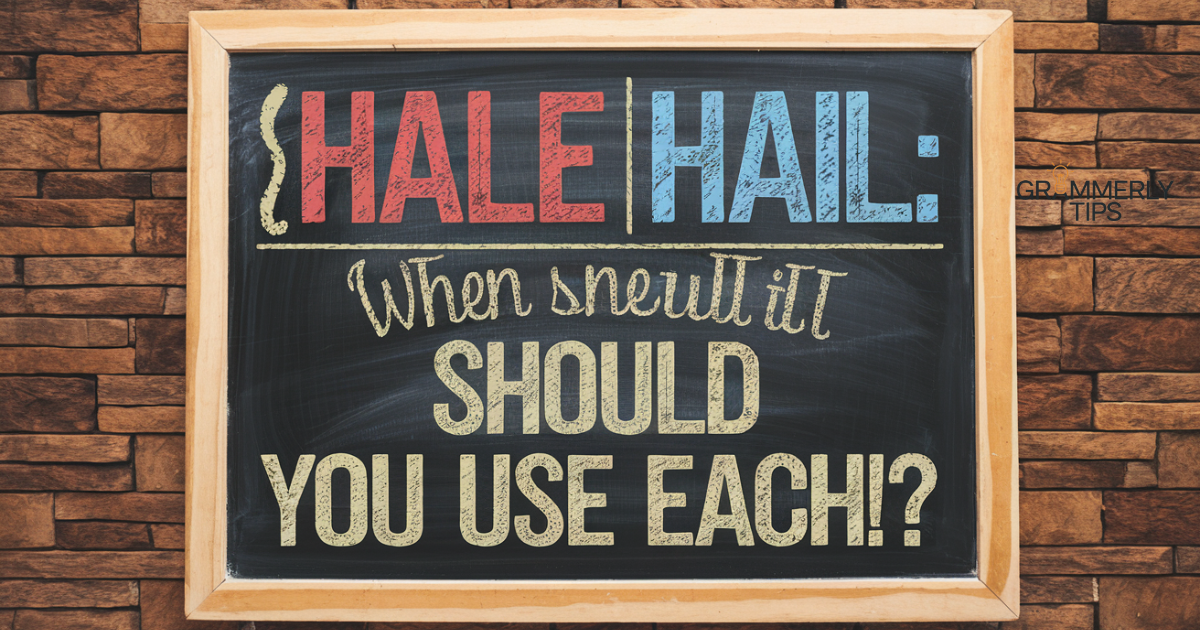Confused about when to use hale or hail? These two words sound identical but have entirely different meanings, which can make them tricky to use correctly. Understanding the difference will help you write more clearly and avoid common mistakes.
“Hale” is an adjective used to describe someone who is strong and healthy, often in reference to older people. On the other hand, “hail” has multiple meanings: as a noun, it refers to frozen raindrops, and as a verb, it can mean to call out or greet. Let’s explore when to use each.
Understanding Hale And Hail

Hale: Definition and Usage
“Hale” is an adjective that means strong and healthy, often used to describe someone in good physical condition. It’s most commonly applied to robust older individuals who exhibit vitality and energy. The term emphasizes physical well-being.
Examples
- Even at 80 years old, he remained hale and active, enjoying daily walks.
- The hale old woman still participated in marathons with impressive stamina.
These examples show how “hale” describes someone who is in excellent physical health, even in old age.
Hail: Definition and Usage
“Hail” can function as both a noun and a verb. As a noun, it refers to frozen raindrops that fall from the sky during storms. As a verb, it means to greet or call out to someone or to express approval and admiration.
Examples (Noun):
- The hail damaged several cars during the sudden storm.
- We had to run inside quickly to avoid getting hit by the large hail.
Examples (Verb):
- The crowd hailed the hero with loud cheers and applause.
- She tried to hail a taxi on the busy New York street.
These examples illustrate how “hail” can refer to ice falling from the sky or the act of calling out to someone or giving acclaim.
You Also Like To Read This: Scull Or Skull: Understanding The Key Differences
How do you use the word hail in a sentence?
You can use “hail” to describe weather involving ice or to indicate calling out to someone or offering praise. Its meaning depends on the context in which it is used.
Examples
- The hail from the storm left dents in the car’s hood.
- Fans gathered to hail the victorious team as they entered the stadium.
How do you use the word hale in a sentence?
“Hale” is used to describe someone who is in excellent physical health, often emphasizing strength and vitality, particularly in older people. It conveys a sense of robust well-being.
Examples
- The hale grandfather amazed everyone with his energetic dance moves.
- Despite his age, he remained hale and hearty, enjoying life to the fullest.
Hail and hale definition, parts of speech, and pronunciation
Hail
- Definition: As a noun, “hail” refers to frozen raindrops that fall from the sky during a storm. As a verb, it means to greet or call out to someone or to praise.
- Parts of Speech: Noun, Verb
- Pronunciation: /heɪl/ (rhymes with “mail”)
Hale
- Definition: “Hale” is an adjective used to describe someone who is strong and healthy, especially referring to older individuals who remain in good physical condition.
- Parts of Speech: Adjective
- Pronunciation: /heɪl/ (rhymes with “mail”)
Side-by-Side Comparison
Here’s a side-by-side comparison Hail and Hail:
| Aspect | Hail | Hale |
| Definition | Noun: Frozen raindrops during a storm. Verb: To greet or call out to someone or to praise. | Adjective: Describes someone who is strong, healthy, and in good physical condition. |
| Parts of Speech | Noun, Verb | Adjective |
| Pronunciation | /heɪl/ (rhymes with “mail”) | /heɪl/ (rhymes with “mail”) |
| Example (Noun) | “The hail damaged the roof during the storm.” | N/A |
| Example (Verb) | “The crowd hailed the hero as he walked by.” | N/A |
| Example (Adjective) | N/A | “The hale man climbed the mountain with ease.” |
| Common Usage | Used in weather-related contexts or when referring to greetings and praise. | Commonly used when describing an individual’s health or physical state. |
| Key Difference | “Hail” relates to weather or calling out, while “hale” refers to someone’s strength and health. | “Hale” emphasizes physical well-being, while “hail” deals with weather phenomena or acclaim. |
“Hail” is most often used when talking about weather conditions or when expressing admiration for someone, as in cheering or praising them. On the other hand, “hale” is typically used to describe someone’s health, particularly when they are strong and free of illness, often used for older individuals. Despite sounding the same, these words differ greatly in meaning and usage.
Everyday Usage Examples

Hail
- Weather: The hail came down so hard that it covered the ground like snow.
- Greeting: As the parade passed by, the crowd hailed the heroes with cheers.
- Praise: The critics hailed the new movie as a masterpiece.
- Calling Out: He tried to hail a cab, but it was too busy to stop.
Hale
- Health: Despite his age, the hale man still ran five miles every morning.
- Physical Strength: She was hale and hearty, lifting boxes without breaking a sweat.
- Description of Older Individuals: The hale grandmother still gardened every day and stayed active.
- General Well-being: After recovering from his illness, he felt hale and full of energy again.
FAQs
What is the difference between Hale and Hail?
- Hale is an adjective used to describe someone who is strong, healthy, and in good physical condition.
- Hail can be a noun referring to frozen raindrops that fall from the sky or a verb meaning to greet, call out, or praise someone.
Is it Hale or Hail Caesar?
The correct phrase is “Hail Caesar!”. In this context, “hail” means to greet or salute someone, often with admiration or reverence.
Where do you hail from or Hale from?
The correct phrase is “Where do you hail from?”. It means asking where someone is originally from or where they live.
How do you use the word hail?
- As a noun: The hail was so big it damaged the car’s windows.
- As a verb: The fans hailed the athlete for her victory in the race.
Conclusion
In conclusion, while “hale” and “hail” may sound the same, they have distinct meanings and uses. “Hale” refers to a person’s health or strength, often describing someone in good physical condition. On the other hand, “hail” is used to describe frozen raindrops or as a verb meaning to greet or praise someone.
It’s important to understand the context to use these words correctly in everyday conversation. Mastering their usage ensures clear and effective communication.

Grammerlytips.com, authored by Jame, offers expert tips and insights on mastering grammar, enhancing writing skills, and boosting communication effectiveness.

